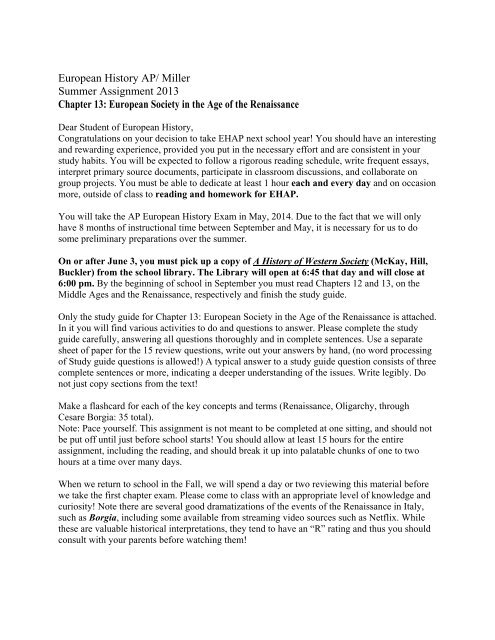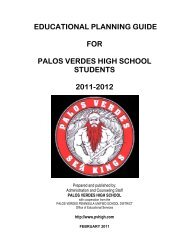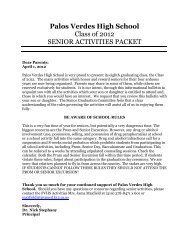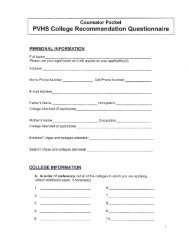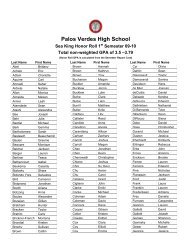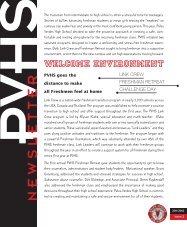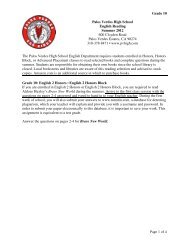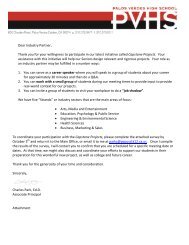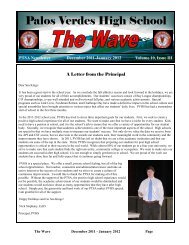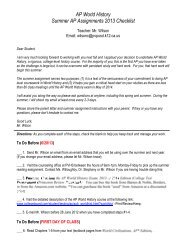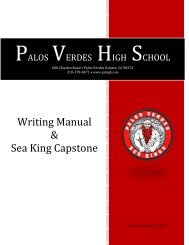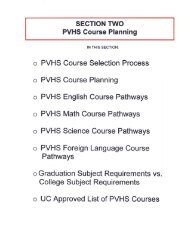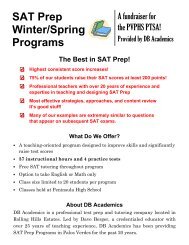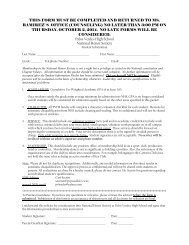European History AP/ Miller Summer Assignment 2013 Chapter 13 ...
European History AP/ Miller Summer Assignment 2013 Chapter 13 ...
European History AP/ Miller Summer Assignment 2013 Chapter 13 ...
You also want an ePaper? Increase the reach of your titles
YUMPU automatically turns print PDFs into web optimized ePapers that Google loves.
<strong>European</strong> <strong>History</strong> <strong>AP</strong>/ <strong>Miller</strong><strong>Summer</strong> <strong>Assignment</strong> <strong>20<strong>13</strong></strong><strong>Chapter</strong> <strong>13</strong>: <strong>European</strong> Society in the Age of the RenaissanceDear Student of <strong>European</strong> <strong>History</strong>,Congratulations on your decision to take EH<strong>AP</strong> next school year! You should have an interestingand rewarding experience, provided you put in the necessary effort and are consistent in yourstudy habits. You will be expected to follow a rigorous reading schedule, write frequent essays,interpret primary source documents, participate in classroom discussions, and collaborate ongroup projects. You must be able to dedicate at least 1 hour each and every day and on occasionmore, outside of class to reading and homework for EH<strong>AP</strong>.You will take the <strong>AP</strong> <strong>European</strong> <strong>History</strong> Exam in May, 2014. Due to the fact that we will onlyhave 8 months of instructional time between September and May, it is necessary for us to dosome preliminary preparations over the summer.On or after June 3, you must pick up a copy of A <strong>History</strong> of Western Society (McKay, Hill,Buckler) from the school library. The Library will open at 6:45 that day and will close at6:00 pm. By the beginning of school in September you must read <strong>Chapter</strong>s 12 and <strong>13</strong>, on theMiddle Ages and the Renaissance, respectively and finish the study guide.Only the study guide for <strong>Chapter</strong> <strong>13</strong>: <strong>European</strong> Society in the Age of the Renaissance is attached.In it you will find various activities to do and questions to answer. Please complete the studyguide carefully, answering all questions thoroughly and in complete sentences. Use a separatesheet of paper for the 15 review questions, write out your answers by hand, (no word processingof Study guide questions is allowed!) A typical answer to a study guide question consists of threecomplete sentences or more, indicating a deeper understanding of the issues. Write legibly. Donot just copy sections from the text!Make a flashcard for each of the key concepts and terms (Renaissance, Oligarchy, throughCesare Borgia: 35 total).Note: Pace yourself. This assignment is not meant to be completed at one sitting, and should notbe put off until just before school starts! You should allow at least 15 hours for the entireassignment, including the reading, and should break it up into palatable chunks of one to twohours at a time over many days.When we return to school in the Fall, we will spend a day or two reviewing this material beforewe take the first chapter exam. Please come to class with an appropriate level of knowledge andcuriosity! Note there are several good dramatizations of the events of the Renaissance in Italy,such as Borgia, including some available from streaming video sources such as Netflix. Whilethese are valuable historical interpretations, they tend to have an “R” rating and thus you shouldconsult with your parents before watching them!
REVIEW QUESTIONSCheck your understanding of this chapter by answering the followingquestions. Each answer should consist of at least three sentences.1. What is humanism? What do humanists emphasize?2. How did the invention of movable type revolutionize <strong>European</strong> life?3. How did the Renaissance in northern Europe differ from that of Italy?4. Discuss Christian humanism by describing the works and ideas of Thomas More andDesiderius Erasmus.5. Why did Italy become a battleground for the <strong>European</strong> superpowers after l494?6. What were the obstacles to royal authority faced by the kings of France in the fifteenthcentury? How did Charles VII and his successors strengthen the French monarchy?7. What devices did Henry VII of England use to check the power of the aristocracy andstrengthen the monarchy?8. What were the achievements of Ferdinand and Isabella in the areas of national power andterritorial expansion?9. Why were blacks valued in Renaissance society? What roles did they play in the economic and sociallife of the times?10. In what ways did life for upper-class women change during the Renaissance?11. How was Renaissance art different from medieval art?12. Who were the New Christians (conversos) in Spain and why were many ultimately killed orexpelled?<strong>13</strong>. Describe the new social class in twelfth-century Italy called the "urban nobility." How and why didthis social class come into being and how did it affect the movement toward republican government?(note: this question asks about a time preceding the Renaissance.)14. What five powers dominated the Italian peninsula in the fifteenth century? How did the Italian citystatescontribute to modern diplomacy?15. How does the concept of individualism help explain the Renaissance? Did women and commonpeople play a role in the Renaissance?
STUDY-REVIEW EXERCISES/FlashcardsMake a flashcard for each of the items listed below. Include information about howthe item connects to the overall themes of the chapter, ie: Art, Politics, Religion,etc.RenaissanceoligarchysignoricommunespopoloreconquistahumanismsecularismSpanish conversosindividualismmaterialismhermandadesMachiavellianJan HusEnglish Royal Council and Court and Court of Star ChamberConquest of GranadaHabsburg- Valois warsBrunelleschi’s Foundling Hospital in FlorencePico della MirandolaDesiderius ErasmusJan van EyckThomas MoreDonatelloBaldassare CastiglioneNiccolo MachiavelliJohn GutenburgLefevre d’ EtaplesLorenzo Valla
SavonarolaJerome BoschFrancois RabelaisLouis XI of FranceHenry VII of EnglandFerdinand and Isabella of SpainCharles VII of FranceCesare Borgia


